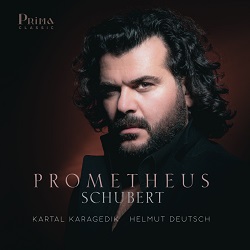Als gewiefter Opernsänger versteht der aus Izmir (Türkei) stammende Bariton Kartal Karagedik, seit 2015 Ensemblemitglied der Staatsoper Hamburg, die Auswahl an bekannten und selten gehörten, von antiker Mythologie inspirierten Liedern Franz Schuberts ausdrucksvoll zu singen.
Mit seinen Gestaltungen trifft er die Abgründe an Sehnsucht, die Trauer um Verlorenes, den Weltschmerz, die innere Angst vor dem Ungewissen und die Konfrontation mit letzten Fragen sehr gut. Er wird dabei prächtig unterstützt von Helmut Deutsch am Klavier.
Dabei ist zu begrüßen, dass beide Interpreten keinem Pathos verfallen, sondern immer textadäquat das Emotionale und Eindringliche herausstellen.
Karagediks Stimme ist warm, voll und sehr flexibel, hätte aber von den Mikrophonen etwas besser vom Klavier getrennt werden können.
The baritone Kartal Karagedik from Izmir (Turkey), a member of the ensemble of the Hamburg State Opera since 2015, knows how to expressively sing a selection of well-known and rarely heard songs by Franz Schubert inspired by ancient mythology.
His interpretations capture the depths of longing, the mourning for lost things, the weariness of the world, the inner fear of the unknown and the confrontation with ultimate questions. He is magnificently supported by Helmut Deutsch on piano.
It is to be welcomed that both interpreters do not succumb to pathos, but always emphasize the emotional and urgent in a way that is appropriate to the text.
Karagedik’s voice is warm, full and very flexible, but could have been better separated from the piano by the microphones.




















